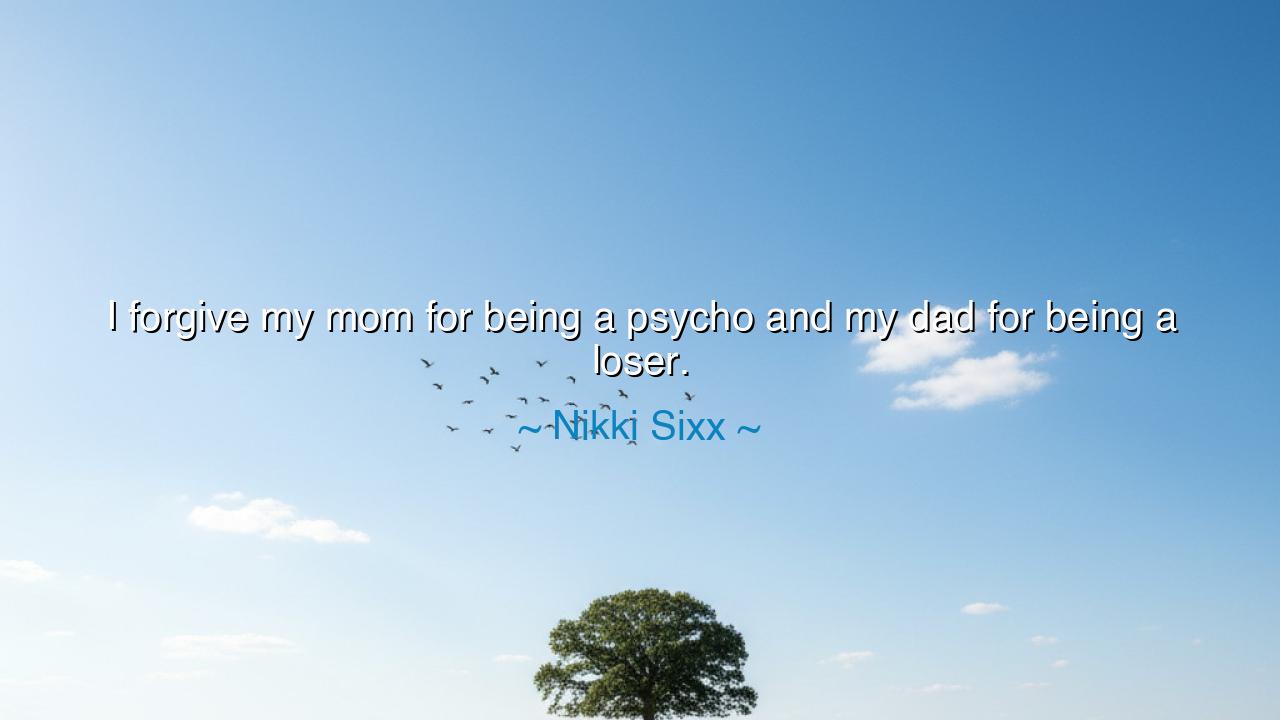
I forgive my mom for being a psycho and my dad for being a loser.






The words “I forgive my mom for being a psycho and my dad for being a loser” were spoken by Nikki Sixx, the fierce and tormented bassist of Mötley Crüe — a man forged in the fires of rebellion and pain. To understand these words is to descend into the wounded heart of a son who faced chaos in the place meant for peace, and yet rose above it with the weapon of forgiveness. It is not merely a confession; it is a declaration of freedom. The statement bears both the fury of betrayal and the serenity of release — the ancient paradox of healing: that only through forgiving our parents can we cease being prisoners of their sins.
In the days of the ancients, the wise said that every man must battle not against the world first, but against the ghosts of his own blood. Nikki’s words echo this eternal struggle. His mother, unpredictable and consumed by her own storms, and his father, defeated by life’s burdens, represented the dual faces of a broken lineage. Yet in forgiving them, Nikki did not excuse their failures — he transcended them. Like Prometheus unbound from his chains, he reclaimed the divine fire that had been stolen from him by pain and memory. For to forgive is not to forget; it is to reclaim power from the past.
Consider the story of Marcus Aurelius, the Roman emperor-philosopher. Though born to privilege, he too bore the burden of legacy and expectation. When betrayal and sorrow came — even from those close to him — he did not curse his fate. Instead, he wrote in his Meditations: “Begin each day by telling yourself: today I shall meet interference, ingratitude, insolence, disloyalty...” He understood that the faults of others were not his to carry. Likewise, Nikki’s forgiveness was not a gift to his parents; it was a liberation of himself from the bitterness that chained his heart. He forgave to live.
The quote stands as a cry of victory over inherited chaos. Many who suffer from broken homes and unhealed wounds mistake bitterness for strength. They cling to resentment as if it were armor, not realizing it corrodes from within. The ancients would say: “He who drinks the poison of anger hoping his enemy will die shall perish first.” In forgiving his “psycho” mother and “loser” father, Nikki became the alchemist of his own pain — turning lead into gold, darkness into art, torment into transcendence. His music, wild and defiant, was not only rebellion; it was redemption.
Let us not mistake forgiveness for weakness. To forgive those who wounded you in childhood — those who should have protected you — requires a warrior’s heart. It demands that one face the abyss without hatred, and stand upright despite it. True forgiveness is not passive; it is an act of moral courage, a declaration that the cycle ends with you. It is the quiet thunder of a soul that chooses peace over vengeance.
From this quote, we learn that the past, though unchangeable, does not hold dominion unless we surrender to it. The sins of our fathers are not ours to bear, unless we choose to carry them. The lesson is clear: forgive not because they deserve peace — but because you do. In forgiving, you cut the thread that binds you to their failures, and you begin the sacred work of writing your own story.
So, let this be your teaching: Look upon those who wronged you — your parents, your friends, your world — and say, “You will not define me.” Forgive them in the stillness of your heart, not for their sake, but for the sanctity of your own spirit. Then rise. Build anew. Create beauty from ruin. As the ancients would counsel: “The man who conquers others is strong; the man who conquers himself is mighty.”
And thus, Nikki Sixx’s words, raw and profane, become ancient wisdom reborn — a modern psalm of survival and sovereignty.






AAdministratorAdministrator
Welcome, honored guests. Please leave a comment, we will respond soon